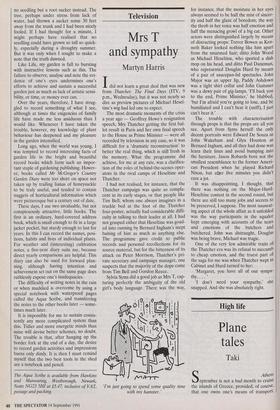Television
Mrs T and sympathy
Martyn Harris
Idid not learn a great deal that was new from Thatcher: The Final Days (ITV, 9 p.m., Wednesday), but it was not nearly so dire as preview pictures of Michael Hesel- tine's wig had led one to expect.
The most dramatic moments of the crisis a year ago — Geoffrey Howe's resignation speech, Mrs Thatcher getting the first bal- lot result in Paris and her own final speech to the House as Prime Minister — were all recorded by television in any case, so it was difficult for a 'dramatic reconstruction' to better the real thing, which is still 'fresh in the memory. What the programme did achieve, for me at any rate, was a clarifica- tion of the roles of behind-the-scenes oper- ators in the rival camps of Heseltine and Thatcher.
I had not realised, for instance, that the Thatcher campaign was quite so compla- cent in its early stages, or that people like Tim Bell, whom one always imagines in a truckle bed at the foot of the Thatcher four-poster, actually had considerable diffi- culty in talking to their leader at all. I had not grasped either that Heseltine was goad- ed into running by Bernard Ingham's inept baiting of him as much as anything else. The programme gave credit to public records and personal recollections for its source material, but for the bitterness of its attack on Peter Morrison, Thatcher's pri- vate secretary and campaign manager, one suspects that the majority of the dope came from Tim Bell and Gordon Reece.
Sylvia Syms did a good job as Mrs T, cap- turing perfectly the ambiguity of the old girl's body language. There was the way, 'I'm just going to spend some quality time with my hamster.' for instance, that the moisture in her eyes always seemed to be half the mist of sincer- ity and half the glaze of boredom; the way the throb in her voice was half emotion and half the menacing growl of a big cat. Other actors were distinguished largely by means of distracting props: Trevor Bowen as Ken- neth Baker looked nothing like him apart from the smarmed hair; ditto John Wood as Michael Heseltine, who sported a dish mop on his head, and ditto Paul Daneman, who represented Douglas Hurd by means of a pair of saucepan-lid spectacles. John Major was an upper lip, Paddy Ashdown was a tight shirt collar and John Gurnmer was a dewy pair of gig-lamps. back you to the end, Prime Minister,' he blubbed, 'but I'm afraid you're going to lose, and be humiliated and I can't bear it (sniff), I just can't bear it.'
The trouble with characterisation through props is that the props are all you see. Apart from Syms herself the only decent portraits were Edward De Souza as John Wakeham and Glyn Houston as Bernard Ingham, and all they had done was learn their lines and avoid bumping into the furniture. Jason Robards bore not the smallest resemblance to the former Ameri- can President when he played Richard Nixon, but atler five minutes you didn't care a jot.
It was disappointing, I thought, that there was nothing on the Major-Hurd- Heseltine contest in the second round, but there are still too many jobs and secrets to be preserved, I suppose. The most nauseat- ing aspect of the whole affair as it unfolded was the way participants in the squalor kept emerging with accounts of the tears and emotions of the butchers and butchered. John was distraught, Douglas was being brave, Michael was tragic.
One of the very few admirable traits of the Thatcher era was its refusal to succumb to cheap emotion, and the truest part of the saga for me was when Thatcher wept in Cabinet and Hurd turned to her: `Margaret, you have all of our sympa- thy. . . . '
`I don't need your sympathy,' she snapped. And she was absolutely right.


















































 Previous page
Previous page